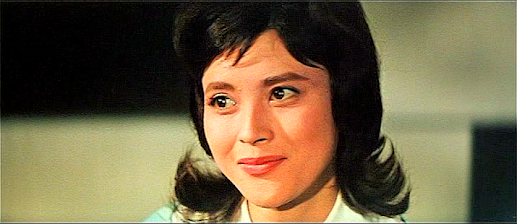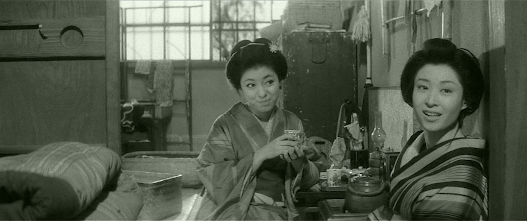Obscure Japanese Film #190
 |
| Mariko Okada |
After one of her uncles dies, Akie (Mariko Okada), a spirited young woman from Hakone, inherits his confectionary business in Kyoto. The company, Kagimura, is famous for an agar-based sweet called Kyo shigure, but the master confectioner, Taniji (Minpei Tomimoto), is the only one who knows how to prepare it properly and he’s in prison after accidentally killing an employee in a fight (which, oddly, nobody seems too bothered about). Akie originally intends to turn the premises into a dressmaking business instead, but when Tajiji is released, he makes Kyo shigure for her and she’s so impressed that she decides to revive her late uncle’s business.
 |
| Nobuko Otowa |
One day, Akie’s mother, Keiko (Nobuko Otowa), arrives with a companion, Yaoi (Keiji Sada). He’s a woodblock artist who has come to Kyoto to sketch some maiko (apprentice geisha), and Keiko has suggested that he stay with Akie instead of at an inn as she has plenty of space. Akie and Yaoi fall in love, but he’s already married with two children – and what exactly is the nature of his relationship with Keiko?
 |
| Keiji Sada |
Like the previously-reviewed Wedding Day, Sweet Secret and Ai sureba koso, this was distributed by Shochiku but produced by Kindai Eiga Kyokai, an independent company formed in 1950 by director Kozaburo Yoshimura, screenwriter Kaneto Shindo and Taiji Tonoyama, the latter of whom appears here as one of Akie’s uncles. The story was cobbled together from two novels by Hisao Sawano (1912-92), both of which were published the same year the film was released. Sawano was best-known for his novel River of the Night, filmed by Yoshimura in 1956.
For the first hour, the film is as light and insubstantial as a soufflé, and appears to be a simple rom-com made as a vehicle for Mariko Okada, who undergoes innumerable costume and hairstyle changes and whose charm the picture relies heavily upon. However, the tone eventually becomes more serious, even throwing in a suicide that seemed to me entirely superfluous. The message of the movie is very clear by the end, but it’s also a rather simple and conservative one, basically implying that one should not break the conventional rules of society as there are good reasons for them and the best thing to do if disappointed in love is repress your feelings and work, work, work!
In my view, this is a minor effort from director Kozaburo Yoshimura, though it’s not without interest. For no good reason, it throws in Ganjiro Nakamura as an avant-garde potter, and there’s a surprisingly sensual moment when Akie sucks the pipe smoke from Yaoi’s mouth, while Toshiro Mayuzumi’s score is inventive and steers admirably clear of cliché. On the whole, though, Onna no saka is likely to be best enjoyed by fans of Mariko Okada.
Bonus trivia: Kyo shigure appears to be a genuine dessert, although I have no idea whether it was created before or after the film existed, or even especially created for it. Those with a sweet tooth can find out more here (in Japanese).

















